- Home
- Fergus Hume
The Mystery of a Hansom Cab Page 6
The Mystery of a Hansom Cab Read online
Page 6
The soup had just been removed when someone who was late, entered with apologies and took his seat. Someone in this case was Mr Felix Rolleston, one of the best known young men in Melbourne. He had an income of his own, scribbled a little for the papers, was to be seen at every house of any pretentions to fashion in Melbourne, and was always bright, happy, and full of news. Whenever any scandal occurred, Felix Rolleston was sure to know it first, and could tell more about it than anyone else. He knew everything that was going on, both at home and abroad. His knowledge, if not very accurate, was at least extensive, and his conversation was piquant and witty. As Calton, one of the leading lawyers of the city, said: ‘Rolleston put him in mind of what Beaconsfield said of one of his characters in Lothair, “He wasn’t an intellectual Croesis, but his pockets were always full of sixpences.”’ There was a good deal of truth in Calton’s remark, and Felix always distributed his sixpences freely. The conversation had been dull for the last few minutes at the Frettlby dinner table, consequently, when Felix arrived, everybody brightened up, as they felt certain now that the conversation would be amusing.
‘So awfully sorry, don’t you know,’ said Felix, as he slipped into a seat by Madge, ‘but a fellow like me has got to be careful of his time—so many calls on it.’
‘So many calls in it, you mean,’ retorted Madge, with a disbelieving smile. ‘Confess, now, you have been paying a round of visits.’
‘Well, yes,’ assented Mr Rolleston, ‘that’s the disadvantage of having a large circle of acquaintances. They give you weak tea and thin bread and butter, whereas—’
‘You would rather have a B. and S. and some devilled kidneys,’ finished Brian.
There was a laugh at this, but Mr Rolleston disdained to notice the interruption.
‘The only advantage of five o’clock tea,’ he went on, ‘is, that it brings people together, and one hears what’s going on.
‘Ah, yes, Rolleston,’ said Mr Frettlby, who was looking at him with an amused smile. ‘What news have you?’
‘Good news, bad news, and such news as you have never heard of,’ quoted Rolleston gravely. ‘Yes, I have a bit of news—haven’t you heard it?’
As no one knew what the news was they could not very well say that they had, so Rolleston was happy, having found out that he could make a sensation.
‘Well, do you know,’ he said, gravely fixing in his eyeglass, ‘they have found out the name of the fellow that was murdered in the hansom cab.’
‘Never!’ cried everyone eagerly.
‘Yes,’ went on Rolleston, ‘and what’s more, you all know him.’
‘It’s never Whyte,’ said Brian, in a horrified tone.
‘Hang it, how did you know?’ said Rolleston, rather annoyed at being forestalled. ‘Why, I just heard it at the St Kilda station.’
‘Oh, easily enough,’ said Brian, rather confused. ‘I used to see Whyte constantly, and as I had not set eyes on him for the last two weeks, I thought it might be him.’
‘How did they find out who it was,’ asked Mr Frettlby, idly toying with his wine glass.
‘Oh, one of those detective fellows, you know,’ answered Felix. ‘They know everything.’
‘I’m sorry to hear it,’ said Frettlby, referring to the fact that Whyte was murdered. ‘He had a letter of introduction to me, and seemed a clever, pushing, young fellow.’
‘A confounded cad,’ muttered Felix, under his breath; and Brian, who overheard him, seemed inclined to assent.
For the rest of the meal nothing was talked about but the murder, and the mystery in which it was shrouded. When the ladies retired they chatted about it in the drawing room, but finally dropped it for more agreeable subjects. The gentlemen, however, when the cloth had been removed, filled their glasses and continued the discussion with unabated vigour. Brian, alone, did not take part in the conversation. He sat moodily staring at his untasted wine, and wrapped in a brown study.
‘What I can’t make out,’ observed Rolleston, who was amusing himself with cracking nuts, ‘is how they did not find out who he was before.’
‘That is not hard to answer,’ said Frettlby, filling his glass, ‘he was comparatively little known here, as he had been out from England such a short time, and I fancy that this was the only house he visited at.’
‘And look here, Rolleston,’ said Calton, who was sitting near him, ‘if you were to find a man dead in a hansom cab, dressed in evening clothes—which nine men out of ten are in the habit of wearing in the evening—no cards in his pockets, and no name on his linen, I rather think you would find it hard to discover who he was. I consider it reflects great credit on the police for finding out so quickly.’
‘Puts one in mind of “The Leavenworth Case,” and all that sort of thing,’ said Felix, whose reading was of the lightest description. ‘Awfully exciting, like putting a Chinese puzzle together. Gad, I wouldn’t mind being a detective myself.’
‘I’m afraid if that was the case,’ said Mr Frettlby, with an amused smile, ‘criminals would be pretty safe.’
‘Oh, I don’t know so much about that,’ answered Felix shrewdly, ‘some fellows are like trifle at a party—froth on top, but something better underneath.’
‘What a greedy simile,’ said Calton, sipping his wine, ‘but I’m afraid the police will have a more difficult task in discovering the man who committed the crime; in my opinion, he’s a deuced clever fellow.’
‘Then you don’t think he will be discovered?’ asked Brian, rousing himself out of his brown study.
‘Well, I don’t go as far as that,’ rejoined Calton, ‘but he has certainly left no trace behind him; and even the Red Indian, in whom instinct for tracking is so highly developed, needs some sort of a trail to find out his enemies. Depend upon it,’ went on Calton, warming to his subject, ‘the man who murdered Whyte is no ordinary criminal; the place he chose for the committal of the crime was such a safe one.’
‘Do you think so?’ said Rolleston. ‘Why I should think that a hansom cab in a public street would be very unsafe.’
‘It is that very fact that makes it safer,’ replied Mr Calton, epigrammatically. ‘You read De Quincey’s account of the Marr murders in London, and you will see that the more public the place the less risk there is of detection. There was nothing about the gentleman in the light coat who murdered Whyte to excite Royston’s suspicions. He got into the cab with Whyte, no noise or anything likely to attract attention was heard, and then he got out. Naturally enough, Royston drove down to St Kilda, and never suspected Whyte was dead till he looked inside and touched him. As to the man in the light coat, he doesn’t live in Powlett Street—no—nor in East Melbourne either.’
‘Why not?’ asked Frettlby.
‘Because he wouldn’t have been such a fool as to leave a trail to his own door; he did what the fox often does—he doubled. My opinion is that he either went right through East Melbourne to Fitzroy, or he walked back through the Fitzroy Gardens into town. There was no one about at that time of the morning, and he could walk home to his lodgings, hotel, or wherever it was, with impunity. Of course this is a theory that may be wrong; but from what insight into human nature my profession has given me, I think that my idea is a correct one.’
All present agreed with Mr Calton’s idea, as it really did seem the most natural thing that would be done by a man desirous of escaping detection.
‘Tell you what,’ said Felix to Brian, as they were on their way to the drawing-room, ‘if the fellow that committed the crime is found out, by gad, he ought to get Calton to defend him.’
CHAPTER EIGHT
BRIAN TAKES A WALK AND A DRIVE
When the gentlemen entered the drawing-room a young lady was engaged in playing one of those detestable pieces of music called Morceau de Salon, in which an unoffending air is taken and variations embroidered on it till it becomes a perfect agony to distinguish the tune amid the perpetual rattle of quavers and demisemiquavers. The air in this case was ‘Over the Gar
den Wall,’ with variations by Signor Thumpanini, and the young lady who played it was a pupil of that celebrated Italian musician. When the male portion of the guests entered the air was being played in the bass with a great deal of power (that is, the loud pedal was down), and with a perpetual rattle of treble notes trying, with all their shrill power, to drown the tune.
‘Gad! it’s getting over the garden wall in a hailstorm,’ said Felix, as he strolled over to the piano, for he saw that the musician was Dora Featherweight, an heiress to whom he was then paying attention, in the hopes that she might be induced to take the name of Rolleston, together with the present owner of the same. So, when the fair Dora had paralysed her audience with one final bang and rattle, as if the gentleman going over the garden wall had tumbled into the cucumber frame, Felix was loud in his expressions of delight.
‘Such power, you know, Miss Featherweight,’ he said, sinking into a chair, and mentally wondering if any of the piano strings had given way at that last crash, ‘you put your heart into it—(and all your muscle, too, by gad)’—he added mentally.
‘It’s nothing but practice,’ answered Miss Featherweight with a modest blush, ‘I am at the piano four hours every day.’
‘Oh, Lord,’ groaned Felix, ‘what a time the family must have of it;’ but he kept this remark to himself, and, screwing his eyeglass into his left organ of vision, merely ejaculated, ‘Lucky piano.’
Miss Featherweight, not being able to think of any answer to this looked down and blushed, while the ingenuous Felix looked up and sighed.
Madge and Brian were in one corner of the room talking together about Whyte’s death.
‘I never did like him,’ she said, ‘but it was horrible to think of him dying like that.’
‘I don’t know,’ answered Brian, gloomily, ‘from all I can hear chloroform is a very easy death.’
‘Death can never be easy,’ replied Madge, ‘especially to a young man so full of health and spirits as Mr Whyte was.’
‘I believe you are sorry he’s dead,’ said Brian jealously.
‘Aren’t you?’ she asked in some surprise.
‘De mortius nil nisi bonum,’ quoted Fitzgerald; ‘but as I detested him when alive you can’t expect me to regret his end.’
Madge did not answer him, but glanced quickly at his face, and for the first time it struck her he looked ill.
‘What is the matter with you, dear?’ she asked, placing her hand on his arm, ‘you are not looking well.’
‘Nothing—nothing,’ he answered hurriedly, ‘I’ve been a little worried about business lately—but come,’ he said, rising, ‘let us go outside, for I see your father has got that girl with the steam whistle voice to sing.’
The girl with the steam whistle voice was Julia Featherweight, the sister of Rolleston’s inamorata, and Madge stifled a laugh as she went on to the verandah with Fitzgerald.
‘What a shame of you,’ she said, bursting into a laugh when they were safely outside, ‘she’s been taught by the best masters.’
‘How I pity them,’ retorted Brian, grimly, as Julia wailed out “Meet me once again” with an ear-piercing shrillness, ‘I’d much rather listen to our ancestral Banshee, and as to meeting her again, one interview would be more than enough.’
Madge did not answer, but leaning lightly over the high rail of the verandah looked out into the beautiful moonlight night. There were a number of people passing along the Esplanade, some of which stopped and listened to Julia’s shrill notes, which, being mellowed by distance, must have sounded rather nice. One man in particular seemed to have a taste for music, for he persistently stared over the fence at the house. Brian and Madge talked of all sorts of things, but every time Madge looked up she saw the man watching the house.
‘What does that man want, Brian?’ she asked.
‘What man?’ asked Brian, starting. ‘Oh,’ he went on indifferently as the man moved away from the gate and crossed the road on to the footpath, ‘he’s taken up with the music, I suppose, that’s all.’
Madge did not say anything, but could not help thinking there was more in it than the music. Presently Julia ceased, and she proposed to go in.
‘Why?’ asked Brian, who was lying back in a comfortable seat, smoking a cigarette, ‘it’s nice enough here.’
‘I must attend to my guests,’ she answered, rising, ‘you stop here and finish your cigarette,’ and with a gay laugh she flitted into the house like a shadow.
Brian sat and smoked, staring out into the moonlight meanwhile. Yes, the man was certainly watching the house, for he sat on one of the seats and kept his eyes fixed on the brilliantly lighted windows. Brian threw away his cigarette and shivered slightly.
‘Could anyone have seen me?’ he muttered, rising uneasily, ‘pshaw, of course not, and the cabman would never recognise me again. Curse Whyte, I wish I’d never set eyes on him.’
He gave one glance at the dark figure on the seat, and then, with a shiver, passed into the warm, well-lighted room. He did not feel easy in his mind, and he would have felt still less so had he known that the man on the seat was one of the cleverest of the Melbourne detectives.
Mr Gorby had been watching the Frettlby mansion the whole evening, and was getting rather annoyed. Moreland did not know where Fitzgerald lived, and as the detective wanted to find out, he determined to watch Brian’s movements and trace him home.
‘If he’s that pretty girl’s lover, I’ll wait till he leaves the house,’ argued Mr Gorby to himself, when he first took his seat on the Esplanade, ‘he won’t stay long away from her, and once he leaves the house, I’ll follow him up till I find out where he lives.’
When Brian made his appearance early in the evening on his way to Mark Frettlby’s mansion, he was in evening dress, with a light coat over it, and also had on a soft hat.
‘Well, I’m dashed!’ ejaculated Mr Gorby, when he saw Fitzgerald disappear. ‘If he isn’t a fool I don’t know who is, to go about in the very clothes he wore when he polished Whyte off, and think he won’t be recognised. Melbourne ain’t Paris or London, that he can afford to be so careless, and when I put the darbies on him he will be astonished. Ah, well,’ he went on, lighting his pipe and taking a seat on the Esplanade, ‘I suppose I’ll have to wait here till he comes out.’
Mr Gorby’s patience was pretty severely tried for hour after hour passed, and no one appeared. He smoked several pipes, and watched the people strolling along in the soft silver moonlight. A bevy of girls passed by with their arms round one another’s waists, and were giggling to one another. Then a young man and woman came walking slowly along, evidently lovers, for they sat down near Mr Gorby and looked hard at him, just to hint that he need not stay. But the detective took no notice of their appealing glances, but kept his eyes steadily on the great house opposite to him, so the lovers took themselves off with a very bad grace. Then he saw Madge and Brian come out on to the verandah, and heard Miss Featherweight’s shrill voice singing, which sounded weird and unearthly in the stillness of the night. He saw Madge go in, and then Brian, the latter turning and staring at him for a minute or so.
‘Ah!’ said Gorby to himself, relighting his pipe, ‘your conscience is a-smiting you, is it? Wait till you’re in gaol.’
Then the guests came out of the house and disappeared one by one, black figures in the moonlight, after kisses and handshaking. Shortly afterwards Brian came down the path with Frettlby by his side, and Madge hanging on to her father’s arm. Frettlby opened the gate, and held out his hand.
‘Goodnight, Fitzgerald,’ he said, in a hearty voice, ‘come down soon again.’
‘Goodnight, Brian, dearest,’ said Madge, kissing him, ‘and don’t forget tomorrow.’
Then father and daughter closed the gate, leaving Brian outside, and walked back to the house.
‘Ah!’ said Mr Gorby to himself, ‘if you only knew what I know, you wouldn’t be so precious kind to him.’
Brian walked along the Esplanade, and then cros
sing over, passed by Gorby and walked on till he was opposite the Esplanade Hotel. Then he leaned his arms on the fence, and, taking off his hat, enjoyed the calm beauty of the hour.
‘What a good-looking fellow,’ murmured Mr Gorby in a regretful tone. ‘I can hardly believe it of him, but the proofs are too clear.’
Such a still night, not a breath of wind stirring, for the breeze had long since died away, and Brian could see the white waves breaking on the yellow sands, the long narrow pier running out like a black thread into the sheet of gleaming silver, and away in the distance the long line of the Williamstown lights like a fairy illumination. Over all this fantastic scene of land and water was a sky such as Doré loved—great heavy masses of rain clouds heaped one on top of the other like the rocks the Titans piled to reach Olympus. Then a break in the white woof and a bit of dark blue sky could be seen glittering with stars, in the midst of which sailed the serene moon shedding down her cold light on the fantastical cloudland beneath, and giving to every one a silver lining. Such a weird bizarre sort of sky that Brian gazed up at it for several minutes, admiring the wonderful beauty of the broken masses of light and shadow, much to the annoyance of Mr Gorby, who had no eye for the picturesque. At last, with a sigh, Mr Fitzgerald withdrew his eyes from the contemplation of the marvellous, and, lighting a cigarette, walked down the steps on to the pier.
‘Suicide is it,’ muttered Mr Gorby to himself, as he saw the tall black figure striding resolutely on, a long way ahead. ‘Not if I can help it.’ So he lighted his pipe, and strolled down the pier in an apparently aimless manner.

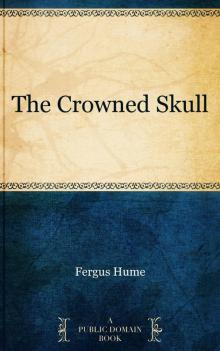 The Crowned Skull
The Crowned Skull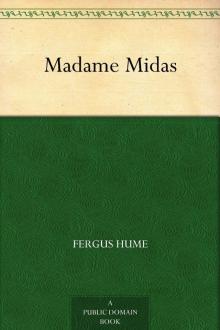 Madame Midas
Madame Midas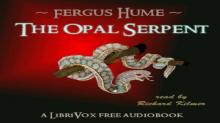 The Opal Serpent
The Opal Serpent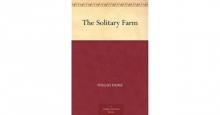 The Solitary Farm
The Solitary Farm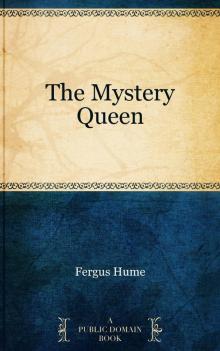 The Mystery Queen
The Mystery Queen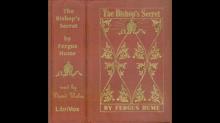 The Bishop's Secret
The Bishop's Secret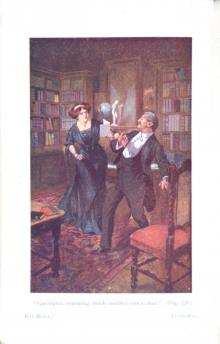 Red Money
Red Money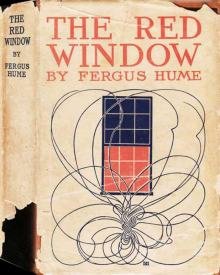 The Red Window
The Red Window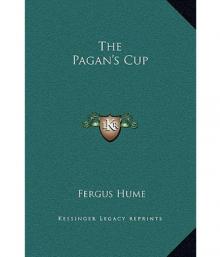 The Pagan's Cup
The Pagan's Cup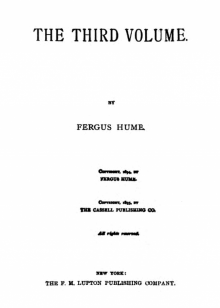 The Third Volume
The Third Volume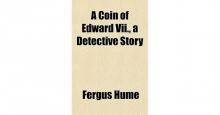 A Coin of Edward VII: A Detective Story
A Coin of Edward VII: A Detective Story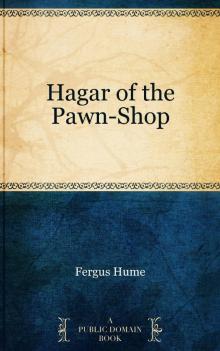 Hagar of the Pawn-Shop
Hagar of the Pawn-Shop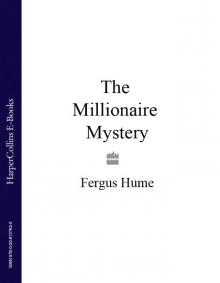 The Millionaire Mystery
The Millionaire Mystery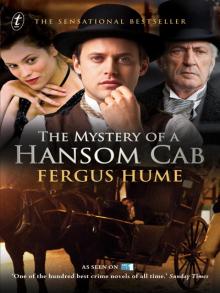 The Mystery of a Hansom Cab
The Mystery of a Hansom Cab